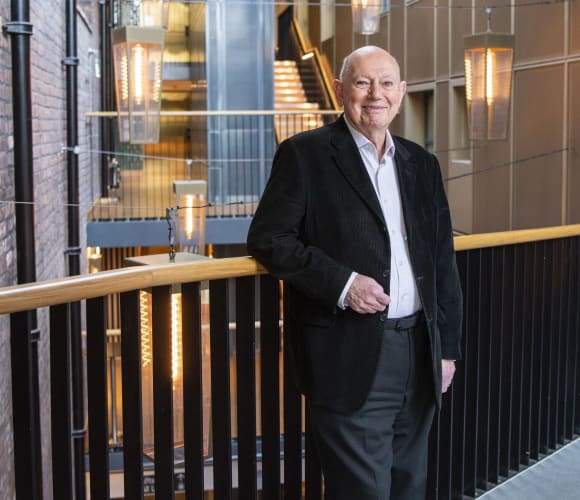English National Opera North was born in 1977 as an offshoot of English National Opera, with the specific intention of delivering high-quality opera to northern England, which had no permanently established opera company. In 1981, the company's name was changed to Opera North and official ties with English National Opera ceased.
I had the pleasure of seeing Falstaff this month at the Theatre Royal. Apart from the quality of the production, enjoying the amusing story along with the live orchestra and singing I was particularly impressed to learn about their ‘Green Season’.
The programme said this, "aims to set new benchmarks for sustainability across the theatre sector. In practice, this means that all three productions—Falstaff, Masque of Might and La rondine—use shared scenic elements to create three interlinked yet distinctive designs, reducing our use of resources, and requiring fewer trucks when we tour. All sets, props, costumes and materials are sourced from previous productions and current stock, or have been acquired second-hand. All this helps to reduce our carbon footprint and contributes towards Opera North’s aim of becoming carbon neutral by 2030.
Wishing to learn more, I spoke to the company's General Director, Sir Richard Mantle.
Sir Richard Mantle, can you please tell us a little about yourself, background, experience and how you came to be involved with Opera North?
I joined Opera North in 1994 following previous roles as Managing Director at Edmonton Opera in Canada and at Scottish Opera, and as Deputy Managing Director at English National Opera. In December, I’ll be retiring as General Director after almost 30 years with the Company.
How and when did this idea of ‘Green Season’ originate and by whom?
Seasons such as this are years in the planning and involve many different people from our planning team through to the directors and designers for each show. A ‘Green Season’ is something we have been keen to do for a while, and I was keen to lead this season before I stepped aside from Opera North, as it’s clear the arts needs to become more sustainable and environmentally aware as we look to the future.
We have staged two sustainable shows previously, most recently Alcina last year, so already had some idea of the challenges we might face in mounting our first ‘Green Season’ and the many production aspects we needed to consider.
What exactly is The Theatre Green Book and when did that come out?
The Theatre Green Book is an initiative which has been set up to guide the theatre industry on its green journey. Working with sustainability experts Buro Happold, it sets standards for making live performance more environmentally friendly, with three volumes covering all aspects of theatre-making from ensuring buildings are sustainable to improving operations like catering and front of house. What it does for organisations such as Opera North is to provide clear performance indicators so we can know exactly what we need to be doing and are able to log our progress against the targets set.
The climate and carbon footprint is an enormous worry and should influence us all and how we conduct our lives. It is marvellous to see theatre, such a big employer and revenue producer for the country taking some positive action on this issue. Has anyone or thing had a big influence on your life and what highlights are you proudest of?
Having spent so much of my career in opera, it is probably fair to say that one of the biggest influences on my life dates to 1961 when I attended the Royal Opera’s first performance of Britten’s A Midsummer Night’s Dream at Covent Garden! In fact, I spent much of my teenage years attending performances at the Royal Opera thanks to a marvellous ticket scheme run by Youth & Music. Of course, many different people have influenced me since then, and continue to do so on a daily basis.
So much has happened during my time with Opera North, including leading two significant capital development projects and steering the company intact through the recent pandemic. It has been a privilege to oversee the development of the company into a multifaceted arts organisation, widely admired for its adventurous and bold creative spirit, for its commitment to musical and theatrical excellence, and for creating extraordinary experiences for audiences and participants in our home city of Leeds and at our touring venues.
How would you like to sum up this ‘green project’?
It feels like a fantastic season on which to end my tenure at Opera North as it so wonderfully demonstrates everything I value most about the chorus, orchestra and everyone who works for the company. It is testament to a huge collaborative effort, with all those involved demonstrating great imagination, ingenuity and commitment to the cause of combining sustainability with the highest level of artistry. I hope our audiences have enjoyed watching the productions as much as we enjoyed creating them.
